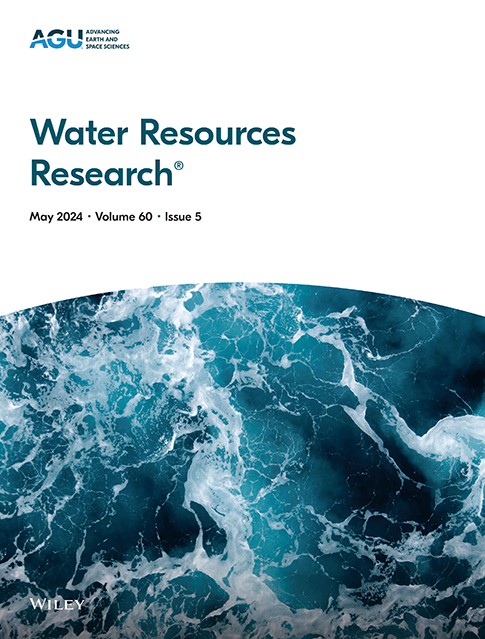月至十年时间尺度上地下水补给对渗透变化的响应的全球评估
IF 4.6
1区 地球科学
Q2 ENVIRONMENTAL SCIENCES
引用次数: 0
摘要
预测地下水在空间和时间上的波动对于可持续水资源管理非常重要。月至十年时间尺度上的渗透变化会导致地下水位的波动,从而导致地下水资源的波动。然而,由于地下水条件与渗透之间的关系往往是高度非线性的,因此人们往往对全球尺度的气候变异与渗透模式和地下水之间的联系知之甚少。此外,由于许多地下水记录不完整,地下水位经常受到人为影响,因此很难确定渗透变化的影响,这也进一步阻碍了人们的理解。以往评估渗透变化如何控制地下水的研究都是基于数量有限的点测量。在此,我们对渗透变化预计将如何影响地下水位进行了全面评估。我们使用从理查兹方程推导出的分析解决方案来模拟水位对理想化的周期性渗透变化的响应,周期从几个月到几十年不等,以近似短期和长期气候变异的影响,从而模拟渗透模式。我们的全球尺度评估揭示了为什么渗透变化会导致特定地区地下水补给的周期性。在地球的大部分陆地表面,渗流通量的短期(季节性和较短时间)变化会受到软弱带的强烈抑制,而超过 1 年的渗流周期会产生瞬时补给,但较干旱地区除外。我们的研究结果可能有助于预测长期地下水位,并有助于改善地下水资源管理。本文章由计算机程序翻译,如有差异,请以英文原文为准。
A Global Assessment of Groundwater Recharge Response to Infiltration Variability at Monthly to Decadal Timescales
Predictions of groundwater fluctuations in space and time are important for sustainable water resource management. Infiltration variability on monthly to decadal timescales leads to fluctuations in the water tables and thus groundwater resources. However, connections between global-scale climate variability and infiltration patterns and groundwater are often poorly understood because the relationships between groundwater conditions and infiltration tend to be highly nonlinear. In addition, understanding is further hampered because many groundwater records are incomplete and groundwater tables are often anthropogenically influenced, which makes identifying the effects of infiltration variability difficult. Previous studies that have evaluated how infiltration variability controls groundwater are based on a limited number of point measurements. Here, we present a global assessment of how infiltration variability is expected to affect groundwater tables. We use an analytical solution derived from Richards' equation to model water level responses to idealized periodic infiltration variability with periods that range from months to decades, to approximate both the effects of short-term and long-term climate variability and thus infiltration patterns. Our global-scale assessment reveals why infiltration variability would lead to periodicity in groundwater recharge in particular regions. The vadose zone strongly dampens short-term (seasonal and shorter) variations in infiltration fluxes throughout most of Earth's land surface, while infiltration cycles exceeding 1 year would yield transient recharge, except in more arid regions. Our results may help forecasting long-term groundwater tables and could support improving groundwater resource management.
求助全文
通过发布文献求助,成功后即可免费获取论文全文。
去求助
来源期刊

Water Resources Research
环境科学-湖沼学
CiteScore
8.80
自引率
13.00%
发文量
599
审稿时长
3.5 months
期刊介绍:
Water Resources Research (WRR) is an interdisciplinary journal that focuses on hydrology and water resources. It publishes original research in the natural and social sciences of water. It emphasizes the role of water in the Earth system, including physical, chemical, biological, and ecological processes in water resources research and management, including social, policy, and public health implications. It encompasses observational, experimental, theoretical, analytical, numerical, and data-driven approaches that advance the science of water and its management. Submissions are evaluated for their novelty, accuracy, significance, and broader implications of the findings.
 求助内容:
求助内容: 应助结果提醒方式:
应助结果提醒方式:


